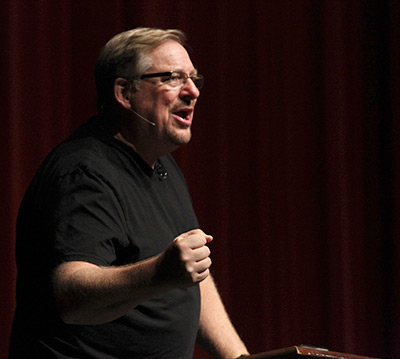Speaking at Anderson University’s second annual John A. Broadus Lectures on Preaching Oct. 2-3, acclaimed pastor and author Rick Warren declared that God’s purpose for preaching is to “make us like Christ.”
 Rick Warren
Rick WarrenWarren, who began preaching 42 years ago at the age of 16 and is a fourth-generation pastor, said that to be Christlike means to “think like Jesus, feel like Jesus and act like Jesus.”
The pastor of Saddleback Community Church in Lake Forest, Calif., speaking in the university’s Daniel Recital Hall, said that he is “addicted to changed lives,” which he said “keeps me going.”
God’s work of transformation into Christ-likeness is accomplished, Warren emphasized, by “the circumstances of life and the application of God’s Word to our lives.” It happens, he pointed out, by a process of sanctification, which he described as “making us progressively like Jesus.”
Inevitable change in peoples’ lives occurs, he said, as they “look at, study and memorize God’s Word.” He said most people have what he called “good forgetters,” noting that 90 to 95 percent of what people hear during a span of 72 hours will be forgotten if not written down. He called for “multiple reinforcement” in learning. Do that, he declared, and “spiritual development will soar.”
The purpose of the Bible itself, he reminded, is life alteration – changing both character and conduct. To the pastors, he encouraged, “Preach for life change rather than just content.”
Warren said the Bible should be viewed not as a history book, but as a “manual for life.”
He said sermons should be life-oriented rather than information-oriented. “All church members know more than they do,” he mentioned, adding that pastors must teach people “to be doers of the Word and not hearers only.”
Preachers, he said, must be “bridge-builders” who link the ancient texts with peoples’ needs today, always searching for the “timeless principle that is true for any age.”
“Bring the ‘then and now’ together,” he charged his audience.
“Study the text,” he said, “find the timeless truth that asks for a response from the congregation, and think of your audience.”
The veteran pastor said there are six things he knows about every audience: “Everybody wants to be loved. Everybody wants their lives to count, to have purpose. No matter how wealthy and successful they are, life is empty without Jesus. Many people are carrying a load of guilt. Many are consumed with bitterness. And there is a universal fear of death.”
What’s a pastor to do? “Apply the truth to their situations, which is personalization,” he said.
“People will put up with a lot of things,” he said, “if the preaching is meeting their needs.”
Vital to preaching, Warren emphasized, is application of Scripture. He said the most doctrinally strong book of the Bible is Romans (which he said is 50 percent application), followed by Ephesians (which is heavily doctrinal, but still is 50 percent application). The Sermon on the Mount, he pointed out, is 100 percent application.
Knowledge without application “produces pride and brings judgment,” he stated.
Warren said it takes “all kinds of preachers to reach all kinds of people. God loves variety. God made you to be you.”
He challenged his audience to continue to learn. “I’ve made a life out of learning,” he said, “and I’m still learning. A growing church requires a growing pastor, and the older you get, the better you get because you know more.”
The lectureship is named for John A. Broadus, one of four founding faculty members of Southern Baptist Theological Seminary in Greenville in 1859. Broadus served as professor of preaching and later president of the seminary. His classic book, “On the Preparation and Delivery of Sermons,” was written while he was teaching in Greenville and was the primary text on the subject for 100 years.
“Broadus was the father of modern expository preaching, and today’s evangelical preachers are his legacy,” said Michael Duduit, dean of Anderson’s College of Christian Studies and executive editor of Preaching magazine.
“We are blessed to be able to reclaim this important part of South Carolina’s Christian heritage through recognizing the Broadus name in connection with this lectureship,” he continued.
The series was launched last year with Haddon Robinson, professor of preaching at Gordon-Conwell Theological Seminary, as the inaugural lecturer.